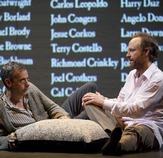SITE GUIDE
SEARCH
REVIEWS
REVIEW ARCHIVES
ADVERTISING AT CURTAINUP
FEATURES
NEWS
Etcetera and
Short Term Listings
LISTINGS
Broadway
Off-Broadway
NYC Restaurants
BOOKS and CDs
OTHER PLACES
Berkshires
London
California
New Jersey
DC
Connecticut
Philadelphia
Elsewhere
QUOTES
TKTS
PLAYWRIGHTS' ALBUMS
LETTERS TO EDITOR
FILM
LINKS
MISCELLANEOUS
Free Updates
Masthead
A CurtainUp Review
The Normal Heart
By Elyse Sommer
| . . .What mad Nijinsky wrote
About Diaghilev Is true of the normal heart . . .Hunger allows no choice To the citizen or the police; We must love one another or die. --- From "September 1, 1939" by W. H. Auden (the full two stanzas follow the cast list in the program. |

Joe Mantello and John Benjamin Hickey in The Normal Heart
(Photo: Joan Marcus) |
The Signature Theater's Angels resonated powerfully with New York audiences, so much so that it had to be extended again and again and required a replacement cast. Now that Kushner's epic has finally closed (and his latest, The Intelligent Homosexual's Guide to Capitalism and Socialism With a Key to the Scriptures, is running at the Public Theater) we have a not to be missed chance to see if Larry Kramer's 1985 The Normal Heart can still hold us in its fierce, agitprop grip.
In a word, it does! In fact, even though my visit to the Golden last Sunday was my third Normal Heart viewing of the play the final wedding scene left me more choked up than ever before. With AIDS still a cancer without a cure and life saving drugs effective but hardly as easy as taking a couple of vitamins daily, Kramer's wake-up call remains pertinent. His plea for gay marriage and a more responsive Health Care System prove him to be way ahead of his time.
For anyone unfamiliar with the plot, a nutshell summary: Ned Weeks, the central character, is a stand-in for the author during the period between May 1981 and July 1984 when AIDS exploded from a health scare with a two digit death rate to a plague of frightening proportions and Kramer was a passionate and often frustrated activist founder of the Gay Men's Health Crisis. The story of Ned's disagreements with the other members of the organization and the the officials at City Hall is concurrent with his love affair with a New York Times fashion and style reporter named Felix Turner, a fictionalized version of an unidentified Times reporter. Another important activist is a character named Dr. Emma Brookner, modeled on Dr. Linda Laubenstein of New York University Center who, like Emma, was victim of another plague, polio.
Okay, so Kramer's semi-autobiographical play tends to deliver its dialogue straight from a soap box and his fight with City Hall and the sly digs at ex-Mayor Koch had already become dated retro-gossip at the time of the last revival in 2004. But there's nothing dated about tight fisted bureaucrats and people, both straight or gay, putting their fears of social or career repercussions and financial interests before the public's welfare. And the proselytizing elements are balanced with fast-paced story telling that, if well staged and performed as it is at the Golden, remains a gripping drama.
With Joe Mantello, who played Louis in the original Angels. . . and has since become a distinguished director, playing the rabble rouser-in-chief, Ned Weeks' personal story is somehow more moving than ever. The unpreposessing looking but nevertheless charismatic Mantello is terrifically compelling as this complex man — an outspoken fighter willing to alienate even his friends and his beloved older brother (a well cast Mark Harelik), but also emotionally needy. Seeing this relationship virgin finally give in to his hunger for real love and be true to the "normal heart" described in the Auden poem "September1, 1939" from which Kramer's play takes its title makes an endearing love story that, thanks to Mantello and John Benjamin Hickey as the New York Times reporter who won't take no for an answer, holds up even when watched a third time as was the case for me.
Joel Grey, who replaced Brad Davis asl Ned Weeks during the play's premiere run and who's currently having a fine time as Moonface Martin. in the strictly for fun Cole Porter musical Anything Goes, is sharing directorial duties with former Public Theater artistic director George C. Wolfe. Together they have elicited fine performances from entire 12-member cast, each of whom have their big moments. To reflect the importance of each character, all the actors remain on stage but in the shadows even when they're not part of a scene. Ellen Barkin is making an impressive Broadway debut as the wheelchair bound Brookner who matches Weeks' fierce anger and despair. While the audience now, as they did during the 2004 revival, often greet the end of quite a few of the sixteen scenes, Brookner's impassioned monologue about her colleagues in the medical profession is understandably a major show stopper.
Using the term show stopper may seem more fitting for a musical than a play about one of modern society's major tragedies and its attendant societal issues, but then despite the rustle of tissues and sobs you're likely to hear before the ending, The Normal Heart is filled with humor and works as an entertaining as well as enlightening drama. With barely any props, David Rockwell, abetted by Batwin +Robin's always changing projections, has created a visually stunning, true to the spirit of the original production environment. The staggering list of names and statistics that permeated the stage and the theater in 1985 have been transformed by Rockwell and the projectionists into a collage that evolves with the story and supports its continuing urgency. Uunlike so many agitprop dramas which tend to be of the moment, this one lives on as a full-blown tragedy with the added parallels to world events that cry for leaders unafraid to speak out.
The production has set up a series of Tuesday night talkbacks to underscore the themes and historical context of the play. Whether you go Tuesday, Wednesday, or any other day of the week, go. If you've seen it before, see it again.
|
The Normal Heart by Larry Kramer Directed by Joel Grey and George C. Wolfe Cast: Ellen Barkin, (Dr. Emma Brookner), Patrick Breen (Mickey Marcus), Mark Harelik (Ben Weeks), John Benjamin Hickey (Felix Turner), Joe Mantello (Ed Weeks), Luke Macfarlane (Craig Donner/Grady), Lee Pace (Bruce Niles), Jim Parsons (Tommy Boatright), Richard Topol (Hiram Keebler/ Examining Doctor), Wayne Wilcox (David) Sets: David Rockwell Costumes: Martin Pakledinaz Lighting: David Weiner Original music and sound: David Van Tieghem Projections: Batwin & Robin Stage Manager: Karen Armstrong Running Time: 2/12 hours with one intermission Golden Theatre 252 W. 45 Street 212/239-6200 Tuesdays at 7pm, Wed to Sat at 8pm, Sundays at 7pm; Saturdays and Sundays at 2pm , From 4/19/11; opening 4/27/11; closing 7/11/11 Tickets $2650 to $116.50 Reviewed by Elyse Sommer at 4/24 press matinee |
|
REVIEW FEEDBACK Highlight one of the responses below and click "copy" or"CTRL+C"
Paste the highlighted text into the subject line (CTRL+ V): Feel free to add detailed comments in the body of the email. . .also the names and emails of any friends to whom you'd like us to forward a copy of this review. Visit Curtainup's Blog Annex For a feed to reviews and features as they are posted add http://curtainupnewlinks.blogspot.com to your reader Curtainup at Facebook . . . Curtainup at Twitter Subscribe to our FREE email updates: E-mail: esommer@curtainup.comesommer@curtainup.com put SUBSCRIBE CURTAINUP EMAIL UPDATE in the subject line and your full name and email address in the body of the message. If you can spare a minute, tell us how you came to CurtainUp and from what part of the country. |

Slings & Arrows-the complete set
You don't have to be a Shakespeare aficionado to love all 21 episodes of this hilarious and moving Canadian TV series about a fictional Shakespeare Company






